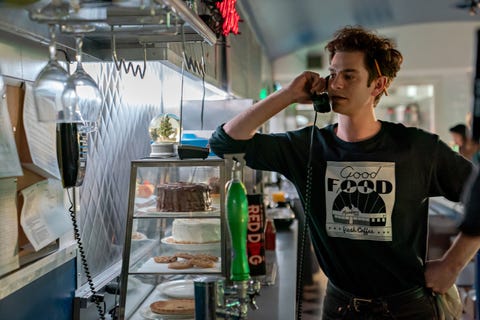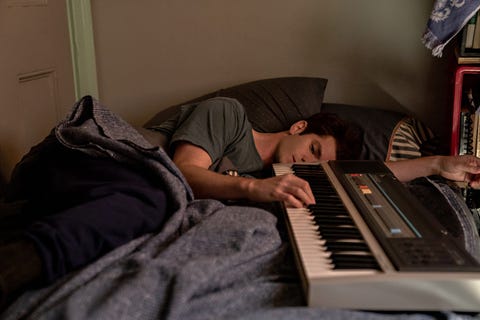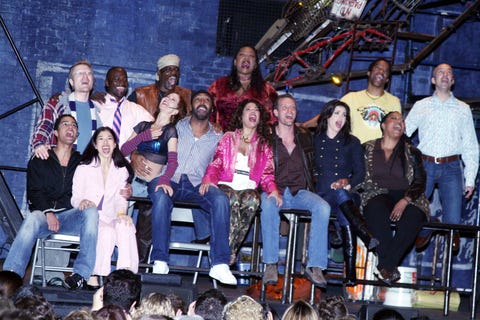Two musical theater legends collide in Netflix’s latest movie musical tick, tick… Boom!, which follows a young theater composer (played by Andrew Garfield) who’s on the brink of turning 30 and wrestling with his decision to follow a career in the arts. The film is based on the semi-autobiographical rock monologue written by Jonathan Larson, who’s best known for writing the musical sensation Rent, and it’s directed by Lin-Manuel Miranda, best known for writing the era-defining show Hamilton.
Miranda has long been a fan of Larson’s work, telling publications over the years that seeing Rent on his 17th birthday was a life-changing moment for him as an artist. “More than anything, it gave me permission to write about my community,” Miranda wrote in the New York Times in 2014. “I grew up in a predominantly Spanish-speaking neighborhood in Upper Manhattan that burst with music and characters, and ‘Rent’ whispered to me, ‘Your stories are just as valid as the ones in the shows you’ve seen.’” Then when he saw tick, tick…Boom! a few years later, the show “grabbed the 21-year old me and refused to let go,” he wrote.
But Miranda was never able to meet Larson, who tragically passed away in 1996 the night before the first public performance of Rent at the New York Theatre Workshop. Now with tick, tick…Boom!, Miranda helps Larson’s legacy live on. Below, more about the legendary playwright, including what happened in those final days of his life.
Larson’s Early Days
In 2006, a documentary about the making of Rent titled No Day But Today: The Story of ‘Rent’ was released, featuring interviews with Larson’s parents, sister, cousins, friends, and former co-workers. In the beginning of the film, Larson’s family paint a picture of his childhood growing up in White Plains, New York, where he was in the school band and chorus and starred in his high school productions. He eventually attended Adelphi University to study acting and also began creating his own music. After graduating, he moved to New York City to focus on writing. Just as Garfield proclaims in tick, tick…Boom!, Larson’s sister says in the documentary that Larson would tell people he was going to change the face of American musical theater.
Creating tick, tick…Boom!
Larson spent years working as a waiter at the Moondance Diner in Manhattan in order to earn money while he was writing and composing. He had paid gigs here and there and worked for a long time on a futuristic musical called Superbia. As we see in the film, legendary composer Stephen Sondheim came to a workshop of the musical, but it was never produced. As Vox reports, Larson was “feeling bitter that every producer who came to his Superbia workshop had told him that it was both too expensive to mount Off-Broadway and too weird to mount on Broadway.”
“Jonathan was devastated by that,” his sister Julie told the New York Post. “So he went to work on a show that was just him, a piano and a band. Nobody could tell him it’s too big.” He started working on a one-man show, which was eventually named tick, tick…Boom! The title refers to the “twin ticking clocks of his potential and his friend’s life, both of which he feared might be about to run out,” per Vox, as Larson had already lost several friends to the AIDS crisis and his real-life best friend had told him he’d contracted HIV.
Theater producer Jeffrey Seller, who’d go on to work on musicals like In the Heights and Hamilton, attended a production of the show and told Larson he wanted to produce his musicals. According to the Post, Seller wrote Larson a letter that read: “Your work–music, lyrics, and spoken word–has an emotional power and resonance that I have rarely experienced in the theatre.”
Then after tick, tick…Boom!, Larson returned to a project he had previously shelved, an adaptation of Giacomo Puccini’s opera La Bohème, which tells the story of two poor artists living in Paris. Playwright Billy Aronson had originally approached Larson about the musical, which would be set in modern-day New York City during the AIDS epidemic. Aronson and Larson eventually parted ways, and Larson moved forward on what would become Rent, alone.
Larson’s Final Days and Untimely Death
New York Theatre Workshop became the first theater to produce Rent, allowing Larson to officially quit his job at the Moondance Diner. But in the lead-up to the show, Larson began having chest pains and nausea, according to his friends and co-workers in the documentary. During one tech rehearsal, Larson collapsed in the back of the theater. He ended up going to the emergency room twice, but doctors found nothing wrong.
He moved forward with the show, and on Jan. 24, 1996, Larson went to Rent’s final dress rehearsal, which took place in front of a full audience. Afterwards, he went to the back of the theater to do an interview with Anthony Tommasini, a critic at the Times, which you can still read here, and headed home at around 12:30 a.m. There, he put water on the stove to make tea and unexpectedly died from an aortic aneurism. It was the morning of the first Off-Broadway preview of Rent. Larson was 35 years old.
The Success of Rent
While his friends and family mourned Larson’s death, Rent took off as an instant success. The show continued to sell out at the New York Theatre Workshop and eventually went to Broadway, where it became a phenomenon. Larson posthumously won the Pulitzer Prize for Drama and three Tony Awards. But, most importantly, Rent did what Larson said he’d do: It changed the face of American musical theater with its rock score and contemporary setting and characters.
In the years after Larson’s death, playwright David Auburn rewrote tick, tick…Boom!, transforming it from a one-man show into a three-part work that premiered Off-Broadway in 2001, bringing even more of Larson’s work to the masses. As Miranda wrote in his 2014 Times piece: “Jonathan, if you can hear me, you fulfilled every promise and then some. We continue to perform your work, and when we do, someone else’s life is changed. Someone else has permission to tell their story because you told yours.”
Watch tick, tick…Boom! on Netflix now.
This content is created and maintained by a third party, and imported onto this page to help users provide their email addresses. You may be able to find more information about this and similar content at piano.io



